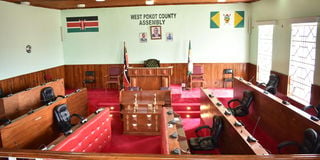People with disabilities protest omission from nomination list

West Pokot County Assembly chambers.
People with disabilities in West Pokot have protested their exclusion from the final list of nominees to the county assembly.
They complained that they have been sidelined from county affairs.
They urged the Independent Electoral and Boundaries Commission (IEBC) to de-gazette the names of nominated MCAs, arguing that genuine nominees were expunged from the final list.
“We are disappointed that political parties, including UDA, Kanu and KUP, did not include any of us in their nomination lists. I personally applied and was shortlisted but my name was missing in the final list,” said Selina Longiro (UDA).
She urged Governor Simon Kachapin and local lawmakers to intervene ahead of the swearing-in slated for Wednesday September 21, 2022.
“If we miss in the assembly, how will we be recognised in employment by the county government as required under the law to get 30 percent? We are being stigmatised yet this is the hustler government and we are the hustlers,” she said.
A disabled member of UDA said that many disabled children in the county are in school but they lack representation.
“The swearing-in of MCAs should be put on hold until the nomination issue is resolved,” said Benjamin Lopuoyang, who is disabled.
The IEBC gazetted 12 people to be sworn in as nominated MCAs alongside 20 elected ward representatives in the West Pokot County Assembly.
The 12 were nominated by UDA, Kanu and KUP.
Eric Kalikwan, another disabled person, said it is against the Constitution to discriminate against them in elective and appointive positions.
“I was number five on the list but my name was removed. We must go to court,” he said.
Constitutional requirement
Lawyer Kevin Kachapin said that the nomination of people with disabilities to county assemblies is a constitutional requirement. They represent the interests of the marginalised group.
“The challenges faced by [the disabled] are immeasurable. The alleged failure to nominate them to 21 county assemblies was a brazen disregard of the law and the threshold of equal representation,” he said.
He said political parties and the IEBC had disregarded laid-down procedures and provisions of the law, arguing that skewed selections will erode the confidence and integrity of the nomination process.





